Paul Verlaine
Selected Poems in Translation
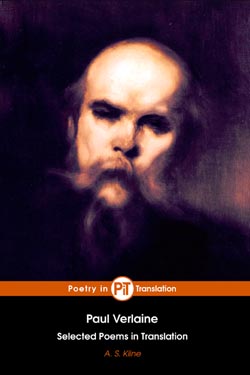
Translated by A. S. Kline © Copyright 2002, 2009, 2010 All Rights Reserved
This work may be freely reproduced, stored and transmitted, electronically or otherwise, for any non-commercial purpose. Conditions and Exceptions apply.
Contents
- Resignation
- Nevermore
- After Three Years
- Wish
- Lassitude
- My Familiar Dream
- Parisian Sketch
- Twilight of a Mystical Evening
- Dusk
- The Nightingale
- Woman And Cat
- Song Of The Artless Ones
- Serenade
- Claire De Lune
- Pantomime
- Out Walking
- The Innocents
- Her Retinue
- The Sea-Shells
- Puppets
- Cythera
- Aboard
- The Faun
- Mandoline
- To Clymène
- Columbine
- Cupid Overthrown
- Muted
- Sentimental Conversation
- In Her Dress….
- Before You Leave, Pale…
- The Moon, White…
- A Saint In Her Aureole….
- Home, The Lamp’s Circumscribed Glow
- I Was Almost Afraid….
- The Noise From Bars….
- Is It Not So?….
- It’s Languorous Ecstasy
- It Rains In My Heart…
- You See We Need…
- The Piano Kissed…
- Oh Sad, Sad…
- Through Interminable Land…
- The Shadow of Trees…
- Walcourt
- Charleroi
- Brussels: Wooden Horses
- Mechelen
- I See You, Still…
- Green
- Spleen
- A Poor Young Shepherd
- Streets – Dansons La Gigue!
- Streets – O La Rivière Dans La Rue!
- Beauty Of Women….
- No. It was Gallican….
- Hear The Sweetest Song….
- I Came, Calm, An Orphan….
- The Sky’s Above The Roof….
- Sadness, The Bodily Weariness…
- Pierrot
- Poetic Art
- Languor
- Circumspection
- To Madame X…
- Parsifal
- Evening Thought
- O La Femme!
- Sleeping Beauty Dreams…
- Allegory
- Sappho
- Girl
- Reversibilities
Resignation
(Poèmes Saturniens: Mélancholia I)
As a child, I dreamt of the Koh-i-Noor,
Persian and Papal richness, sumptuous,
Heliogabalus, Sardanapalus!
My desire conjured, where the gold roofs soar,
To music’s strains, where fragrances entice,
Endless harems, bodily paradise!
Calmer these days and yet no less ardent,
Knowing life, how one’s obliged to be,
I’m forced to curb such lovely folly,
And yet not yield to too great an extent.
So be it, if greatness eludes intent,
Yet down with the nice, and the ordinary!
I always hated a woman merely pretty,
Rhyme that’s assonant, the friend who’s prudent!
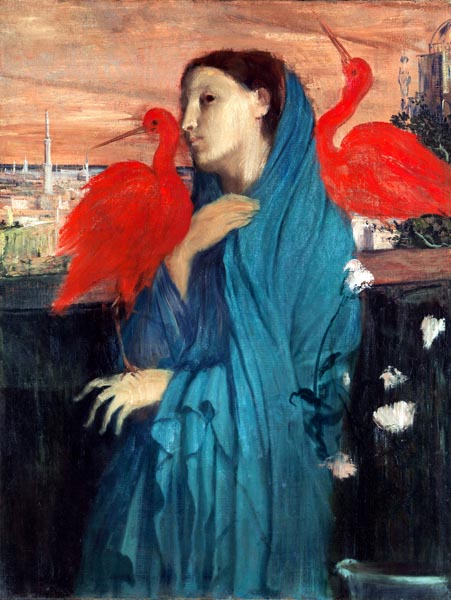
‘Young Woman with Ibis’
Edgar Degas (French, 1834 – 1917)
The Met
Nevermore
(Poèmes Saturniens: Mélancholia II)
Memory, memory, what do you want of me? Autumn
Makes the thrush fly through colourless air,
And the sun casts its monotonous glare
On the yellowing woods where the north winds hum.
We were alone, and walking in dream,
She and I, hair and thoughts wind-blown.
Then, turning her troubling gaze on me,
‘Your loveliest day?’ in her voice of fine gold,
Her voice, with its angel’s tone, fresh, vibrant, sweet.
I gave her my answer, a smile so discreet,
And kissed her white hand with devotion.
– Ah! The first flowers, what a fragrance they have!
And how charming the murmured emotion
Of a first ‘yes’ let slip from lips that we love!
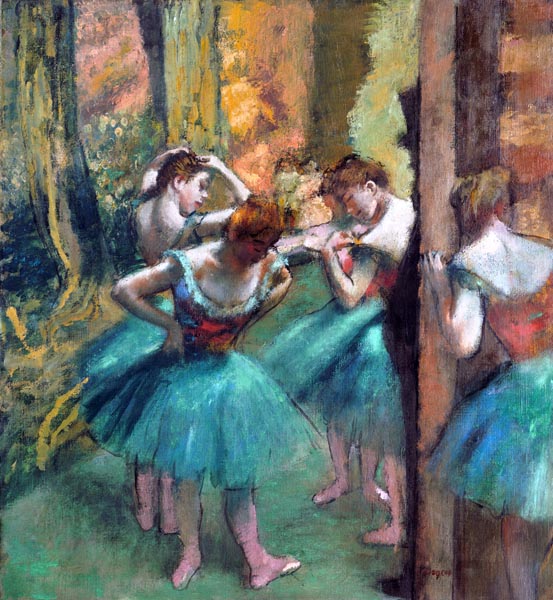
‘Dancers, Pink and Green’
Edgar Degas (French, 1834 – 1917)
The Met
After Three Years
(Poèmes Saturniens: Mélancholia III)
Opening the narrow rickety gate,
I went for a walk in the little garden,
All lit up by that gentle morning sun,
Starring each flower with watery light.
Nothing was changed. Again: the humble arbour
With wild vines and chairs made of rattan…
The fountain as ever in its silvery pattern,
And the old aspen with its eternal murmur.
The roses as then still trembled, and as then
The tall proud lilies rocked in the wind.
I knew every lark there, coming and going.
I found the Veleda statue standing yet,
At the end of the avenue its plaster flaking,
– Weathered, among bland scents of mignonette.
Note: Veleda (Velleda), a German priestess or divinity, celebrated by Maindron’s 1843/44 marble sculpture, much copied as a garden ornament, as were the popular statues of Flora.
![Velléda [Bronze Cast]](https://www.poetryintranslation.com/pics/French/interior_verlaine_velleda.jpg)
‘Velléda [Bronze Cast]’
Étienne Hippolyte Maindron (France, 1801-1884)
LACMA Collections
Wish
(Poèmes Saturniens: Mélancholia IV)
Ah! Fond speech! And the first mistresses!
Hair’s gold, eyes’ blue, the flower of the flesh,
Then, in the scent of the dear body’s mesh
The shy spontaneity of caresses!
How far away now is all that lightness
And all that innocence! Ah, backwards yet,
From black winter fled, to the Springtime of regret,
From my disgust, my boredom, my distress.
So I’m alone now, here, sad and alone,
Sad and desperate, chilled as are the old,
Poor as an orphan with no elder sister.
O for a woman in love, tender and mild,
Sweet, pensive, dark, and always astonished,
Who now and then kisses your brow like a child.
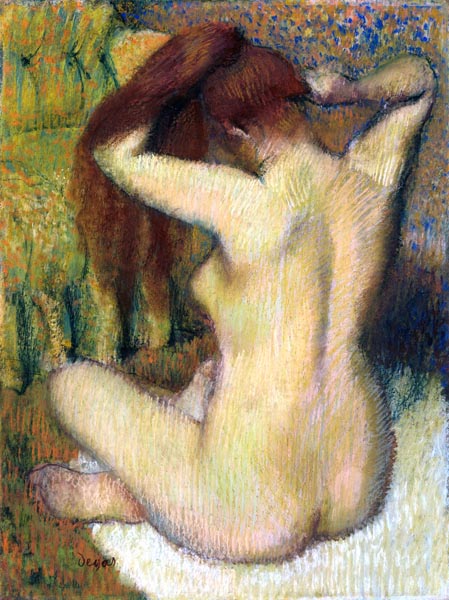
‘Woman Combing Her Hair’
Edgar Degas (French, 1834 – 1917)
The Met
Lassitude
(Poèmes Saturniens: Mélancholia V)
‘For the wars of love a field of feathers’
Gongora
With sweetness, with sweetness, with sweetness!
Calm this feverish rapture a little, my charmer.
Even at its height, you see, sometimes, a lover
Needs the quiet forgetfulness of a sister.
Be languid: make your caresses sleep-bringers,
Like your cradling gazes and your sighs.
Ah, the jealous embrace, the obsessive spasm,
Aren’t worth a deep kiss, even one that lies!
But you say to me, child: in your dear heart of gold
Wild desire goes sounding her cry.
Let her trumpet away, she’s far too bold!
Put your brow to my brow, your hand on my hand,
Make me those promises you’ll break by and by,
Let’s weep till the dawn, my little firebrand!
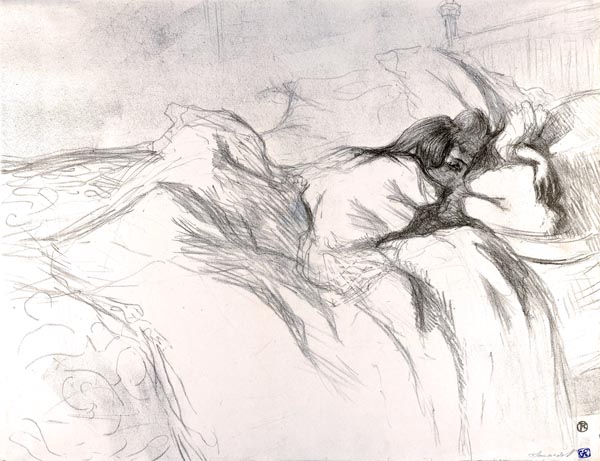
‘Waking Up, from the series Elles’
Henri de Toulouse-Lautrec (French, 1864 - 1901)
The Met
My Familiar Dream
(Poèmes Saturniens: Mélancholia VI)
I often have this dream, strange, penetrating,
Of a woman, unknown, whom I love, who loves me,
And who’s never, each time, the same exactly,
Nor, exactly, different: and knows me, is loving.
Oh how she knows me, and my heart, growing
Clear for her alone, is no longer a problem,
For her alone: she alone understands, then,
How to cool the sweat of my brow with her weeping.
Is she dark, blonde, or auburn? – I’ve no idea.
Her name? I remember it’s vibrant and dear,
As those of the loved that life has exiled.
Her eyes are the same as a statue’s eyes,
And in her voice, distant, serious, mild,
The tone of dear voices, those that have died.
Parisian Sketch
(Poèmes Saturniens: Eaux-Fortes I)
The moon was shedding her plates of zinc
In obtuse angles.
The plumes of smoke like ‘fives’ distinct
Rose thick and black from high roof-tangles.
The sky was grey, there wept a breeze
Like a bassoon.
Far off, a tom-cat, stealthy, discreet,
Miaowed, oh, strangely out of tune.
I, walked, of divine Plato dreaming
And of Phidias,
Salamis, Marathon, under twinkling
Eyes, eyes of blue jets of gas.
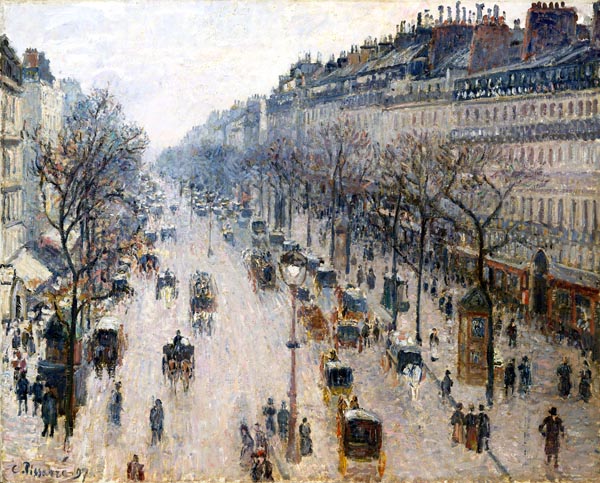
‘The Boulevard Montmartre on a Winter Morning’
Camille Pissarro (French, 1830 – 1903)
The Met
Twilight of a Mystical Evening
(Poèmes Saturniens: Paysages Tristes II, Crépuscule du Soir Mystique)
Memory with Twilight glows
And trembles on the fiery horizon
Of burning Hope that shrinks and grows
Like some mysterious partition
Where the flowers in profusion
– Dahlias, lilies, tulips and marigolds –
Fly round a trellis in their circulation
Among the heady exhalation
Of heavy perfumes, whose warm poison
– Dahlias, lilies, tulips and marigolds –
Drowning my senses, soul and reason,
Mingles in their immense confusion
Memory with Twilight’s glows.
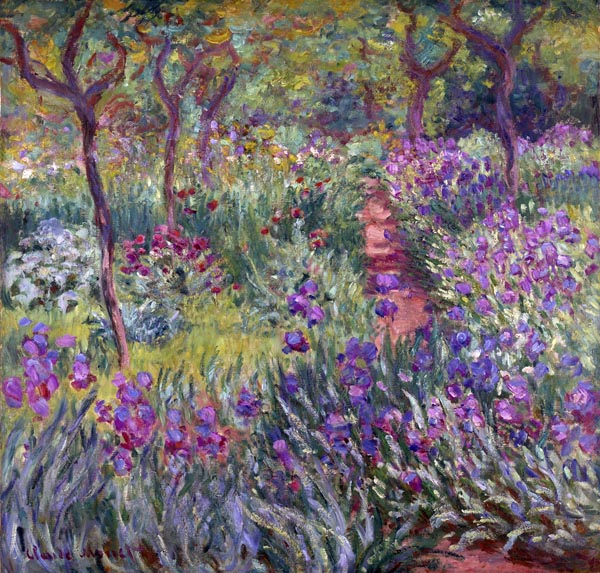
‘The Artist’s Garden in Giverny’
Claude Monet (French, 1840 - 1926)
Yale University Art Gallery
Dusk
(Poèmes Saturniens: Paysages Tristes VI, L’Heure du Berger)
The moon is red on the misted horizon;
In a fog that dances, the meadow
Sleeps in the smoke, frogs bellow
In green reeds through which frissons run;
The lilies close their shutters,
The poplars stretch far away,
Tall and serried, their spectres stray;
Among bushes the fireflies flicker;
The owls are awake, in soundless flight
They row through the air on heavy wings,
The zenith fills, sombrely glowing.
Pale Venus emerges, and it is Night.
The Nightingale
(Poèmes Saturniens: Paysages Tristes VII, Le Rossignol)
Like a loud flight of birds, dark complexity,
All my memories beating down on me,
Beating down through the yellow foliage
Of my heart’s bent alder-trunk, its gaze
Silvered violet in the lake of Regret,
Whose melancholy is still flowing yet,
Beat down, and then the evil murmur
That a moist rising breeze quells there,
Dies away by degrees in the leaves, so
In an instant you will hear no more, oh,
No more than a voice extolling the Absent,
No more than the voice – oh, languishment! –
Of the bird, my First Love, that still sings
As it did long ago on those first evenings;
And below the sad splendour of the moon
Rising in pale solemnity, a June
Night, melancholy, heavy with summer,
Full of silence and darkness, in the azure
That a gentle wind brushes, rocks asleep
The tree that trembles, the nightingale that weeps.
Woman And Cat
(Poèmes Saturniens: Caprices I, Femme et Chatte)
She was playing with her cat:
And it was lovely to see
The white hand and white paw
Fight, in shadows of eve.
She hid – little wicked one! –
In black silk mittens
Claws of murderous agate,
Fierce and bright as kittens’.
The other too was full of sweetness,
Sheathing her sharp talons’ caress,
Though the devil lacked nothing there…
And in the bedroom, where sonorous
Ethereal laughter tinkled in the air,
There shone four points of phosphorus.
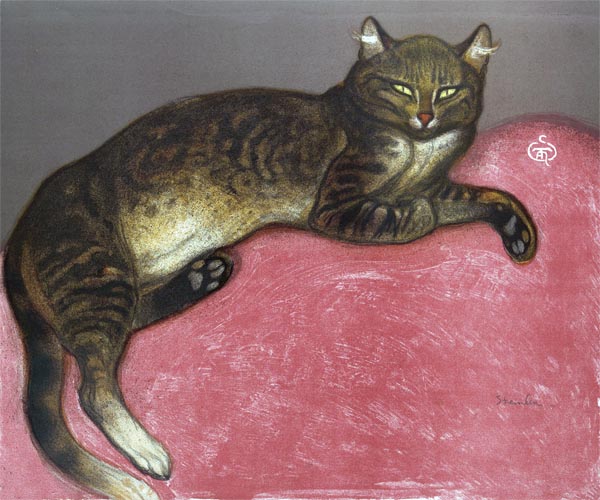
‘Cat on a Cushion’
Théophile-Alexandre Steinlen (French (born Switzerland), 1859 – 1923)
The Met
Song Of The Artless Ones
(Poèmes Saturniens: Caprices II, La Chanson des Ingénues)
We are the artless ones,
Hair braided, eyes blue,
Who live almost hidden from view
In novels barely read.
We walk, arms interlaced,
And the day’s not so pure
As the depths of our thoughts,
And our dreams are azure.
And we run through the fields
And we laugh and we chatter,
From dawn to evening,
We chase butterflies’ shadows:
And shepherdesses’ bonnets
Protect our freshness
And our dresses – so thin –
Are of perfect whiteness.
The Don Juans, the Lotharios,
The Knights all eyes,
Pay their respects to us,
Their greetings and sighs:
In vain though, their grimaces:
They bruise their noses,
On ironic pleats
Of our vanishing dresses:
And our innocence still
Mocks the fantasies
Of those tilters at windmills
Though sometimes we feel
Our hearts beat fiercely
With clandestine dreams,
Knowing we’ll be future
Lovers of libertines.
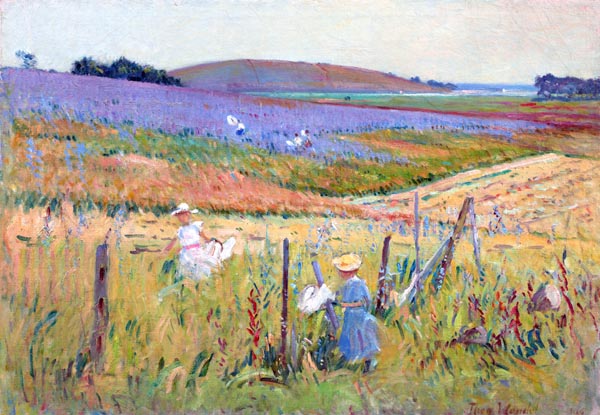
‘The Butterfly Catchers’
Theodore Wendel (American, 1859 - 1932)
Minneapolis Institute of Art
Serenade
(Poèmes Saturniens: Sérénade)
As the voice of a dead man might sing
From the depths of the grave,
My Mistress, tuneless and shrill, echoing
Towards you, the voice that I raise.
Open your soul and hear the sound
Of my mandoline:
For you I wrote this song, for you, I found
This cruel, tender thing.
I will sing your eyes of gold and onyx,
Clear of every shadow,
Then the Lethe of your breast, the Styx
Of your hair’s dark flow.
As the voice of a dead man might sing
From the depths of the grave,
My Mistress, tuneless and shrill, echoing
Towards you, the voice that I raise.
Next I will praise, above all
That blessed flesh
Whose opulent perfumes recall
Insomnia’s distress.
To conclude, I will tell of the kiss
Of your red lip,
And how sweet my martyrdom is,
– My angel! – My Whip!
Open your soul and hear the sound
Of my mandoline:
For you I wrote this song, for you, I found
This cruel, tender thing.
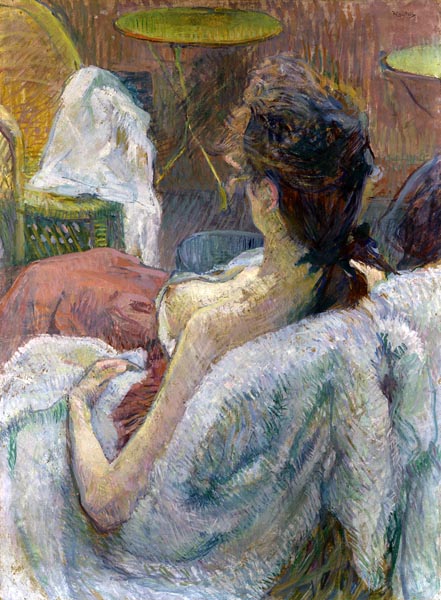
‘The Model Resting’
Henri de Toulouse-Lautrec (French, 1864 - 1901)
Getty Open Content Program
Claire De Lune
(Fêtes Galants: Claire de Lune)
Your soul is the choicest of countries
Where charming maskers, masked shepherdesses,
Go playing their lutes and dancing, yet gently
Sad beneath fantastic disguises.
While they sing in a minor key
Of all-conquering love and careless fortune,
They seem to mistrust their own fantasy
And their song melts away in the light of the moon,
In the quiet moonlight, lovely and sad,
That makes the birds dream in the trees, all
The tall water-jets sob with ecstasies,
The slender water-jets rising from marble.
Pantomime
(Fêtes Galants: Pantomime)
Pierrot, who’s no Clitandre (Molière knew)
Empties a bottle with no more ado,
And, practical as ever, starts a pâté.
Cassander, at the end of the avenue,
Sheds there an unnoticed tear or two
For his nephew, disinherited today.
That scoundrel Harlequin has seen
To the kidnapping of Columbine
And pirouettes four times.
Columbine dreams, surprised as we
To feel a heart within the breeze
And hear, in her heart, voices rhyme.
Out Walking
(Fêtes Galants: A La Promenade)
The sky so pale the trees so slender
Seem to smile at our bright dress
That floats lightly, with an excess
Of nonchalance, a wing-like tremor.
And the gentle wind wrinkles the pool,
And the light of the sun that softens too
The shade of the limes on the avenue
Renders us, as it will, mordant, blue.
Exquisite deceivers, charming coquettes
Tender hearts, but devoid of vows,
Speak with us delightfully and bow,
And lovers flirt with their little pets,
A hand imperceptibly will enlist
Now and then a tap, exchanged
For a kiss on the little finger ranged
At the very tip, and since the thing is
Immensely excessive and quite fierce,
One is punished by a withering glance,
Which contrasts with, as it may chance,
The forgiving pout that the lips rehearse.
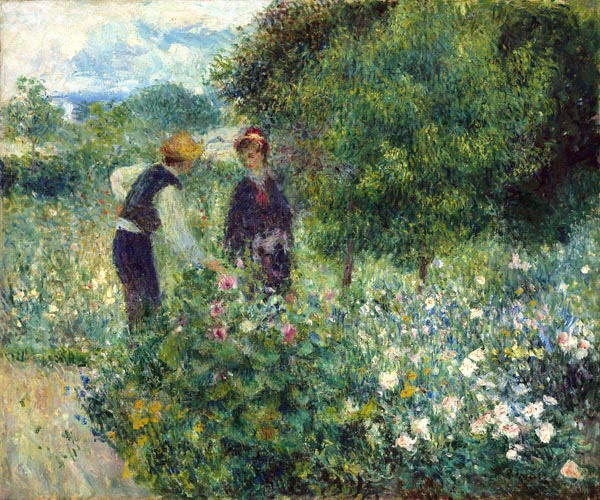
‘Picking Flowers’
Auguste Renoir (French, 1841 - 1919)
National Gallery of Art
The Innocents
(Fêtes Galants: Les Ingénus)
High heels fought with their long dresses,
So that, a question of slopes and breezes,
Ankles sometimes glimmered to please us,
Ah, intercepted! – Dear foolishnesses!
Sometimes a jealous insect’s sting
Troubled necks of beauties under the branches,
White napes revealed in sudden flashes
A feast for our young eyes’ wild gazing.
Evening fell, ambiguous autumn evening:
The beauties, dreamers who leaned on our arms,
Whispered soft words, so deceptive, such charms,
That our souls were left quivering and singing.
Her Retinue
(Fêtes Galants: Cortège)
A monkey in brocaded vest
Gambols and cavorts for She
Who twists a lace handkerchief
In her hand gloved to the wrist,
While a small black slave in red
Holds the train, at arm’s length,
Of her heavy robe, intent
To see that no fold’s disordered.
The monkey never takes his eyes
From the lady’s soft white throat.
Opulent treasure whose rich note
Asks a god’s torso, bare, as prize.
The slave will sometimes raise the height,
Rascal, higher than he needs,
Of his sumptuous load, so he
May see what he dreams of at night;
Yet she appears now unaware
As up the flight of stairs she goes
How insolent approval shows
In her familiar creatures’ stare.
The Sea-Shells
(Fêtes Galants: Les Coquillages)
Each shell, encrusted, we see,
In the cave where we sought love’s goal,
Has its own peculiarity.
One has the purple colour of souls,
Ours, thief of the blood our hearts possess
When I burn and you flame, like hot coals.
That one affects your languorousness,
Your pallor, your weary form
Angered by my eyes’ mocking caress:
This one mimics the charm
Of your ear, and this I see
Your rosy neck, so full and warm:
But one, among all of them, troubled me.
Puppets
(Fêtes Galants: Fantoches)
Scaramouche and Pulcinella,
Gathered for mischief together
Gesticulate, black on the moon.
While the most excellent doctor
He of Bologna, slowly gathers
Herbs from the grass’s womb.
But his daughter, piquant-eyed,
To the arbour on the sly,
Glides, half-naked, on a quest
For her Spanish buccaneer:
A nightingale tender clear
Proclaiming its distress.
Cythera
(Fêtes Galants: Cythère)
A summer-house’s lattices
Tenderly hide our caresses,
Joy the rose-tree cools, sweet friend:
Scents of the rose, languidly,
Thanks to the passing summer breeze,
With her own fragrance blend:
As the promise her eyes gave,
Her courage is complete, while her
Lips yield exquisite fever:
And Love having sated all things save
Appetite: jams and sorbets here
Keep from us the ache of hunger.
Aboard
(Fêtes Galants: En Bateau)
The shepherd’s star, it shivers,
The steersman, in darker waters,
Seeks fire in the depths of his trousers.
Now’s the hour, Gentlemen, or never,
To be daring, and you’ll discover
My hands, from now on, all over!
Atys, the knight, scratching at
His guitar, on cool Chloris casts
A glance, and a wicked one at that.
The priest confesses poor Églé,
And that Vicomte, in disarray,
Prince of the Fields, gives his heart away.
Meanwhile the moon sheds its glow
On the skiff’s brief course below,
Gaily riding the dream-like flow.
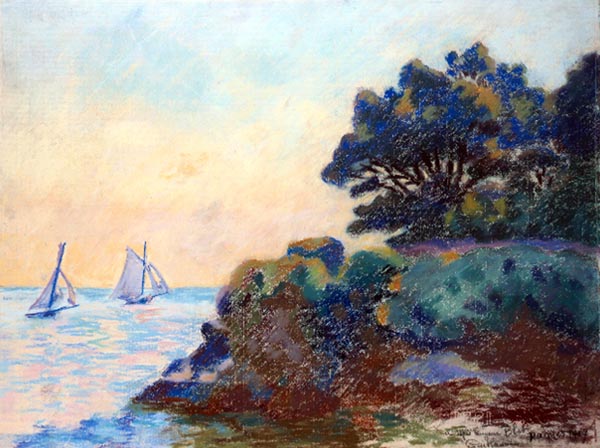
‘Landscape with Two Sailing Boats’
Armand Guillaumin (French, 1841 – 1927)
The Met
The Faun
(Fêtes Galants: Le Faune)
An ancient faun of terra-cotta
Centring the bowling-green
Laughs, without doubt presaging,
A sad end to this time serene,
Which has led me and has led you,
Melancholy pilgrims lean,
To this hour whose vanishing
Swirls to the sounding tambourine.
Mandoline
(Fêtes Galants: Mandoline)
The players of serenades
And their lovely listeners
Swap insipid remarks, made
Beneath singing branches.
Here are Tircis and Aminta
And the eternal Clitander,
And Damis who makes for many a
Cruel one, many a verse that’s tender.
Their jackets of silk cut short,
The long trains of their robes,
Their elegance, joyous retorts,
And their soft bluish shadows,
Whirl in the ecstasy
Of a moon that’s pink and grey,
While among the gusts of breeze
The mandoline tinkles away.
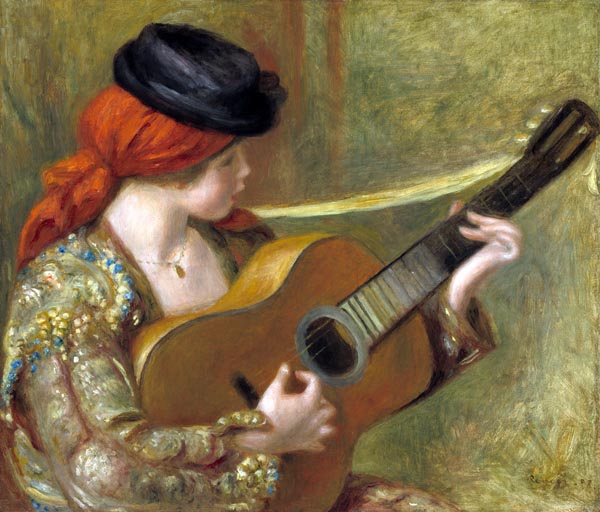
‘Young Spanish Woman with a Guitar’
Auguste Renoir (French, 1841 - 1919)
National Gallery of Art
To Clymène
(Fêtes Galants: A Clymène)
Mystical singing-birds,
Romances without words,
Dear, because your eyes
The shade of skies,
Because your voice, strange
Vision that must derange,
Troubling the horizon
Of my reason,
Because the rare perfume
Of your swanlike paleness,
Because the innocence
Of your fragrance,
Ah, because all your being,
Music so piercing,
Clouds of lost angels,
Tones and scents,
Has by soft cadences
With its correspondences,
Lured my subtle heart, Oh
Let it be so!
Columbine
(Fêtes Galants: Columbine)
Leander the fool,
Pierrot hopping too
Like a flea
And leaping the wood,
Cassander with hood
Monkishly,
And then Harlequin,
That scoundrel of sin
Fantastic,
Mad-costumed so,
His eyes a-glow,
Can’t mask it,
– Do, mi, so, mi, fa –
All from wide and far,
Go laughing
Sing for her, dancing
That arch little thing
Enchanting
Whose eyes perverse
Green or something worse
Like a cat,
Cry, in her charms’ cause,
‘Ah, mind where your paws
Are at!’
– Ever and on they go!
Fateful stars that flow
The faster,
Oh, say, towards what
Cruel or dismal lot,
What disaster
This implacable flirt,
Nimbly lifting her skirt,
Her troops,
A rose in her hair,
Leads onward there,
Her dupes?
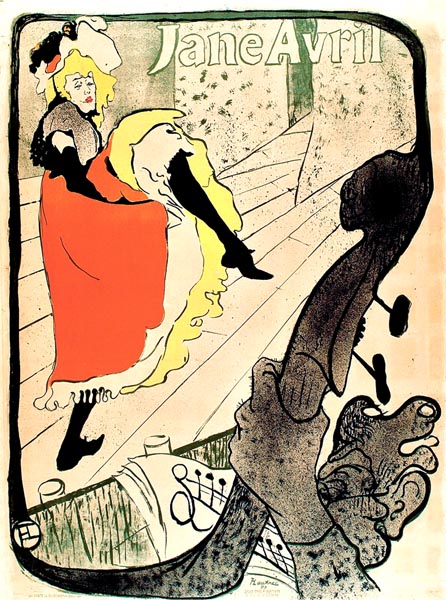
‘Jane Avril’
Henri de Toulouse-Lautrec (French, 1864 - 1901)
The Met
Cupid Overthrown
(Fêtes Galants: L’Amour par Terre)
Last night’s wind saw Cupid’s overthrow,
Who, in the park’s most mysterious corner,
Would bend his bow in guileful laughter,
His aspect causing us to daydream so!
Last night’s wind toppled him! The marble
Shattered with dawn’s breath. It’s sad to see
His pedestal, with sculptor’s name a mystery,
Scarce legible in the shadow of an arbour.
Oh, it’s sad to see the empty pedestal
All bare! And melancholy fancies entering
Wander through my dream, where deep chagrin
Calls up a future solitary and fateful.
Oh, it’s sad! – And you feel it, yes, you too,
Touched by the sight, though your roaming eye
Toys with the gold and crimson butterfly
Skimming the debris on the pathway strewn.
Muted
(Fêtes Galants: En Sourdine)
Calm in the half-light
Tall branches surround,
Let our love be filled by
This silence profound.
Hearts and souls blend there
And senses’ ecstasy,
With the vague languor
Of pine and strawberry.
With eyelids scarce apart,
Arms crossed in dream,
From your slumbering heart
Chase forever every scheme.
Let’s be convinced at last
By the sweet lulling breeze
That makes the russet grass
Wave, in ripples, at your feet.
And when solemn evening
Falls from black oaks there,
The nightingale will sing,
The voice of our despair.
Sentimental Conversation
(Fêtes Galants: Colloque Sentimental)
In the lonely old park’s frozen glass
Two dark shadows lately passed.
Their lips were slack, eyes were blurred,
The words they spoke scarcely heard.
In the lonely old park’s frozen glass
Two spectral forms invoked the past.
‘Do you recall our former ecstasies?’
‘Why would you have me rake up memories?’
‘Does your heart still beat at my name alone?’
‘Is it always my soul you see in dream?’ – ‘Ah, no’.
‘Oh the lovely days of unspeakable mystery,
When our mouths met!’ – ‘Ah yes, maybe.’
‘How blue it was, the sky, how high our hopes!’
‘Hope fled, conquered, along the dark slopes.’
So they walked there, among the wild herbs,
And the night alone listened to their words.
In Her Dress….
(La Bonne Chanson: III)
With her dress of grey-green frills,
One June day, I was feeling anxious,
She appeared, smiling at my glances,
The one I admired without fear of ill.
She came, went, returned, spoke, and sat,
Serious, light, ironic, tender,
And I felt, deep in my soul, so sombre,
Some joyous reflection of all that:
Her voice, its subtle music’s tone,
Delightfully accompanying
The artless wit of a sweet chattering
Where a kind heart’s joy was shown.
I was as quickly, once the semblance
Of my rebellion was over, wholly
In the power of that little Fairy,
As since I’ve sought to be, trembling.
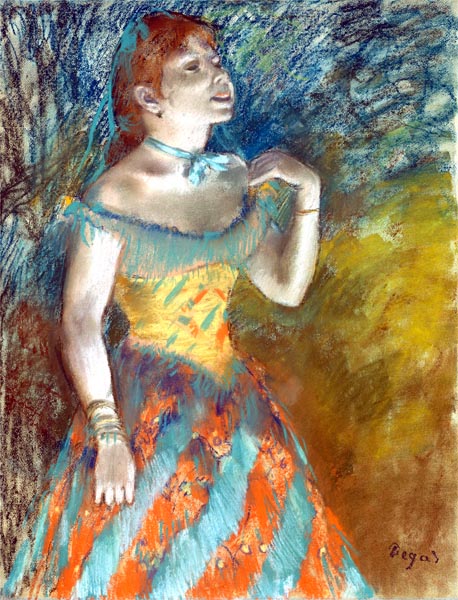
‘The Singer in Green’
Edgar Degas (French, 1834 – 1917)
The Met
Before You Leave, Pale…
(La Bonne Chanson: V)
Before you leave, pale
Morning star that shines,
– A thousand quail
Calling, calling in the thyme –
Turn towards your poet,
With sad eyes so lovelorn,
– The lark as yet
Still climbs the sky with dawn –
Turn here your gaze, that day
Drowns in his azure;
– What joy always
In fields of ripening corn! –
And make my thoughts glow
There – far, oh, far away,
– The dew shines so,
Shines glistening on the hay –
Within the sweet dream
Where yet my love makes one…
– Swiftly, swiftly,
For here’s the golden sun! –
The Moon, White…
(La Bonne Chanson: VI)
The moon, white,
Shines in the trees:
From each bright
Branch a voice flees
Beneath leaves that move,
O well-beloved.
The pools reflect
A mirror’s depth,
The silhouette
Of willows’ wet
Black where the wind weeps…
Let us dream, time sleeps.
It seems a vast, soothing,
Tender balm
Is falling
From heaven’s calm
Empurpled by a star…
It’s the exquisite hour.
A Saint In Her Aureole….
(La Bonne Chanson: VIII)
A Saint in her aureole,
A Chatelaine in her tower,
All that contains the soul
Of human grace and amour;
The gilded note; the sound
Of a horn in the woods far away,
Wed to the tender pride found
In noble Ladies of yesterday;
With that, the lofty charm
Of a fresh conquering smile
Born in the swan’s pure calm
And the blushes of a grown child;
Pearl aspects, of white and rose,
Sweet patrician harmony:
I see, I hear all I suppose,
In its Carolingian identity.
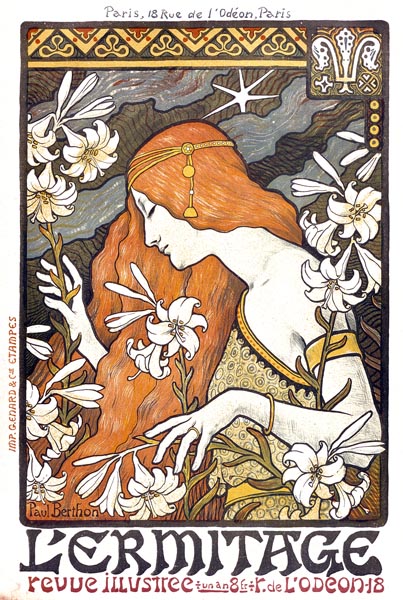
‘The Hermitage’
Paul Berthon (French, 1872 - 1909)
LACMA
Home, The Lamp’s Circumscribed Glow
(La Bonne Chanson: XIV)
Home, the lamp’s circumscribed glow:
Dreaming there with fingers on brow
And looks wandering among loved looks;
The hour of infusions of tea, and closed books;
The sweetness at feeling the evening’s conclusion;
The charming fatigue and adored expectation
Of nuptial shadows and of the soft night,
Oh, all that, my fond dream pursues in flight
Relentlessly, beyond all vain remissions,
Raging at weeks, impatient with seasons!
I Was Almost Afraid….
(La Bonne Chanson: XV)
I was almost afraid, it’s so,
I felt my life so entwined
At the radiance in my mind
That last summer seized my soul,
Your image, forever dear,
So lives in this heart that’s yours,
My heart, uniquely jealous, adores
The loving and pleasing you here;
And I tremble, forgive me please
For speaking so freely to you,
To think that a word, a smile or two
From you is now my destiny,
And it only takes a gesture, but one,
Or a sound or your eye blinking,
To set all my being in mourning
With its heavenly deception.
Yet I would rather see you,
Though the future for me prove sombre
Full of miseries without number,
Than in hope’s distant view,
Plunged in this joy supreme
Tell myself ever and again,
Despite the return of such pain,
That I love you, that I love thee!
The Noise From Bars….
(La Bonne Chanson: XVI)
The noise from bars, the pavement’s mire,
Ruined sycamores leafing on black ire:
The bus, a typhoon of mud and metal,
Bouncing, between wheels, with its rattle,
Rolling its red and green eyes slowly,
Workers off to the club, pipes smoking,
Under the eyes of police, those drones,
Roofs dripping, sweating walls, damp stones,
Broken asphalt, gutters where sewers blend,
Behold, my road – with paradise at the end.
Is It Not So?….
(La Bonne Chanson: XVII)
Is it not so? Despite the fools, the malevolent
Those who’ll never fail to envy our happiness,
We will sometimes be proud and forever indulgent.
Is it not so? We’ll go, gaily, slowly, on the modest
Road that reveals to us Hope smiling,
Whether we’re seen or ignored, ever careless.
Enclosed by love as in a dark wood, exhaling
Our two hearts, their peaceful tenderness,
Will be two nightingales in the dusk singing.
As for the World, let it be angered by us,
Or tender, what can its gestures signify?
Let it make us a target, or let it caress us.
Bound by the strongest and dearest tie,
And more, possessing adamantine armour,
We’ll smile and fear nothing that meets the eye.
Un-preoccupied with whatever Fate destines for
Us, marching onwards and in step we’ll go,
Hand in hand, with the childlike souls, what’s more,
Of those whose love is untainted, is it not so?
It’s Languorous Ecstasy
(Romances Sans Paroles: Arriettes Oubliées I)
‘The wind, on the heath
Suspends its breath.’
Favart
It’s languorous ecstasy,
It’s amorous syncope,
It’s all the wood’s trembling
In the breeze’s embrace
It’s, in branches grey,
All the small voices singing.
Oh the fresh and frail murmur!
It sighs and it whispers,
Resembling the gentle cry
That the grass breathes when stirred…
Or, in cool water blurred,
Of pebbles mutely rolled by.
The soul that laments
In its hushed complaint,
Is ours, is it not so?
Mine, sung, yours again,
With that humble refrain
In this mild evening, so low?
It Rains In My Heart…
(Romances Sans Paroles: Arriettes Oubliées III)
‘It rains softly on the town.’
Rimbaud
It rains in my heart
As it rains on the town,
What languor so dark
That soaks to my heart?
Oh sweet sound of the rain
On the earth and the roofs!
For the dull heart again,
Oh the song of the rain!
It rains for no reason
In this heart lacking heart.
What? And no treason?
It’s grief without reason.
By far the worst pain,
Without hatred, or love,
Yet no way to explain
Why my heart feels such pain!
You See We Need…
(Romances Sans Paroles: Arriettes Oubliées IV)
You see we need to pardon everything.
That’s the way we’ll be happiest,
And if our lives have moments that sting,
At least we’ll weep together and be blessed.
O, sister-souls that we are, could we but blend
A childlike gentleness with vague desires
Travelling far from women and from men,
In the strange forgetfulness of what exiles!
Let’s be two children: let’s be two little girls
In love with nothing, amazed by all life brings,
Pale with fear beneath the leaves’ chaste curls
Not knowing they’ve been forgiven everything.
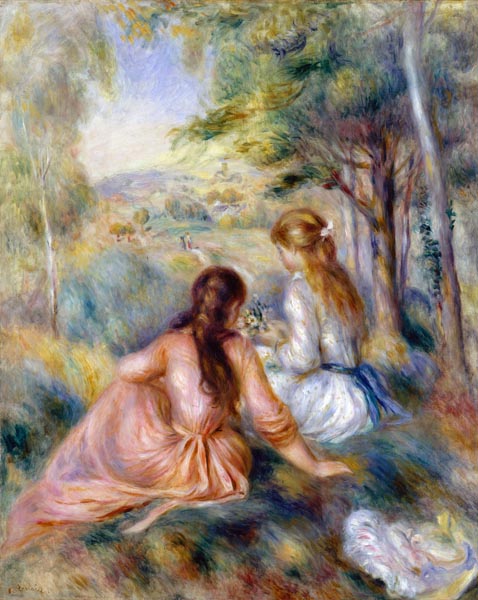
‘In the Meadow’
Auguste Renoir (French, 1841 - 1919)
The Met
The Piano Kissed…
(Romances Sans Paroles: Arriettes Oubliées V)
‘Joyous notes, a sounding harpsichord’s intrusion.’
Pétrus Borel
The piano kissed by a delicate hand
Gleams distantly in rose-grey evening
While with a wingtips’ weightless sound
A fine old tune, so fragile, charming
Roams discreetly, almost trembling,
Through the chamber She’s long perfumed.
What is this sudden cradle song
That gradually lulls my poor being?
What do you want of me, playful one?
What do you wish, slight vague burden
Drifting now, dying, towards the window
Opening a little on a patch of garden?
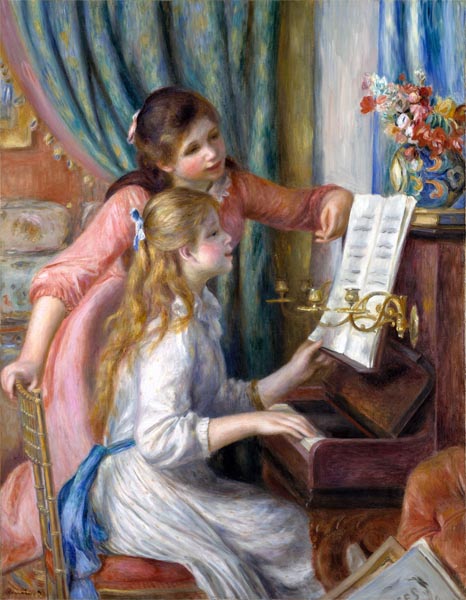
‘Two Young Girls at the Piano’
Auguste Renoir (French, 1841 - 1919)
The Met
Oh Sad, Sad…
(Romances Sans Paroles: Arriettes Oubliées VII)
Oh sad, sad forever my soul
Because, because of a girl.
How can my soul be ever assuaged
Though my heart is disengaged?
Though my heart, though my soul
Are far away from that girl,
How can my soul be ever assuaged
Though my heart is disengaged?
And heart, over-sensitive heart
Says to my soul: by what art,
By what art has it captured me
This proud exile, this misery?
My soul says to my heart: do I
Know myself what trapped us, or why,
Though exiled, we are here today,
Though long ago we went away?
Through Interminable Land…
(Romances Sans Paroles: Arriettes Oubliées VIII)
Through interminable land
Ennui of the plain,
Vague snow once again
Gleams like sand.
The sky is copper
Devoid of any light,
You might almost gather
The moon had lived and died.
Floating clouds
Grey oak-trees lift
In near-by woods
Among the mists.
The sky is copper
Devoid of any light,
You might almost gather
The moon had lived and died.
Wheezing crow
You gaunt wolves too,
When north winds blow
How do you do?
Through interminable land
Ennui of the plain,
Vague snow once again
Gleams like sand.
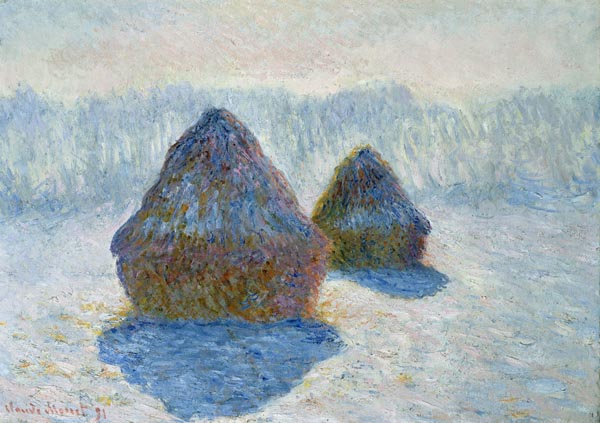
‘Haystacks (Effect of Snow and Sun)’
Claude Monet (French, 1840 - 1926)
The Met
The Shadow of Trees…
(Romances Sans Paroles: Arriettes Oubliées IX)
‘The nightingale that, high on a branch, views itself below,
thinks itself lost in the river. It is perched in the oak tree’s crown
and yet fears death by drowning.’
Cyrano de Bergerac
The shadow of trees on the mist-drenched river
Dissolves like vapour
While in air, among the true branches flown
The turtledoves moan.
How this pale land, oh traveller, too
Pale yourself, mirrors you,
And your drowned hopes how sadly they weep
High in the sighing leaves!
Walcourt
(Romances Sans Paroles: Paysages Belges, Walcourt)
Bricks and tiles
O the charming
Little piles
For lovers’ wiles!
Hops and vines,
Leaves and flowers
Tents with signs
For free drinkers!
Cafes bright,
Beers, clamour,
A waitress, light
For every smoker!
Stations near,
Fine broad streets, too
Godsends dear
To Wandering Jew!
July 1872
Charleroi
(Romances Sans Paroles: Paysages Belges, Charleroi)
Through black grass
The Kobolds go.
The winds that blow
Must weep, alas.
What to think then?
Oat fields sigh.
A slap in the eye
From a bush in passing.
Rather hovels
Than maisons.
What horizons
Of red forges!
One thinks of what?
The stations thunder
The eyes wonder,
Where’s Charleroi?
Sinister perfume!
What was that?
What rattled
Like a sistrum?
Brute locale!
Oh, your breath,
Human sweat
Shrieks of metal!
Through black grass
The Kobolds go.
The winds that blow
Must weep, alas.
Note: Kobolds are sprites in German folklore, usually depicted as humanlike figures the size of small children, often clothed as peasants, or as miners hunched and ugly, or as sailors.
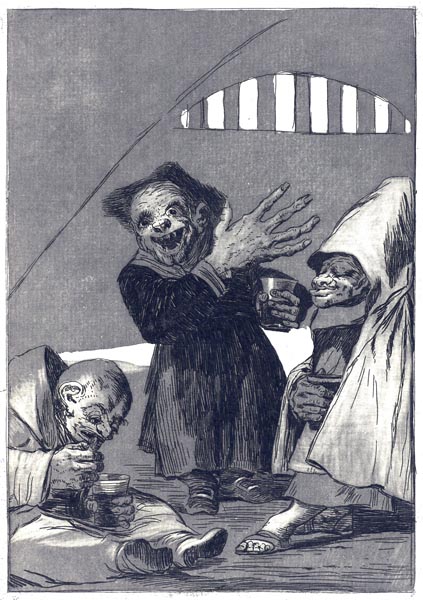
‘Kobolds’
Francisco José de Goya y Lucientes, 1797 - 1799
The Rijksmuseum
Brussels: Wooden Horses
(Romances Sans Paroles: Paysages Belges, Brussels III)
‘By Saint-Gille
Let’s away,
My spring-heeled
Chestnut-bay.’
V. Hugo
Turning, turning, fine horses you go,
Turning a hundred, thousand today,
Turning often and turning always,
Turning, turning to sounds of oboes.
Soldier that’s fat, maid that is fatter
Ride on your backs as in their chamber;
Since, for the day, their masters wander
All through the Cambre Wood together.
Turning, turning, brave steeds of their hearts,
While all around you there go turning
Tricksters, sharpers, cunning eyes gleaming,
Turn to the trumpet’s conquering arts.
Better than drinking away till you spin,
Sailing around this mad circus instead!
Good for the belly, and bad for the head,
Badness en masse then goodness again.
Turning, turning, and no need today
For using the spurs over the ground
Pricking away as you gallop around,
Turn now and turn, there’s no hope of hay.
Speed quickly now, brave steeds of their souls,
Already here night falls from above
Soon will unite the pigeon and dove,
Far from the fair and far from the fold.
Turning and turning! The velvety sky
In starry gold is now slowly arrayed.
There steal beloved, and lover, away.
Turn to the drumbeat, joyous and high.
At the Saint-Gilles fair, August 1872
Mechelen
(Romances Sans Paroles: Paysages Belges, Malines)
By bright fields, the winds fight
With the wind-vanes, fine detail,
The mansion of some magistrate,
Red of brick, and slate-blue light
By the fields, fields without fail!
Like the woods of magic-shows,
Ash, vague bursts of foliage,
Spread to the horizon’s edge,
In this Sahara of meadows,
Clover, lucerne, and pale sedge.
The carts file by in silence
All through these calm ways,
Doze, cows! Now sleep away,
Mild bulls of plains immense,
Under your skies, scarcely day!
The train slides by, not a murmur,
Each wagon here is a salon
Where one speaks softly, and where one
Loves, at leisure, that Nature
Made to suit for Fénelon.
August 1872.
Note: François Fénelon (6 August 1651 – 7 January 1715), the Roman Catholic theologian, poet and writer, is remembered as one of the main advocates of quietism.

‘Portrait of François Fénelon’
Bernard Picart, 1727, The Rijksmuseum
I See You, Still…
(Romances Sans Paroles: Birds In The Night V)
I see you, still. I opened the door.
You lay in bed as if you were weary.
But, O light body that my love bore,
You leapt up naked, crying and happy.
Oh what kisses! What mad embraces!
I myself laughed through my tears.
Surely those moments will leave their traces,
My saddest of all yet best it appears.
I’d not wish to see your smile or worse,
Or your lovely eyes, for that very reason,
Aught of you, in short, whom one must curse,
Exquisite snare, but the ghost of that season.
Green
(Romances Sans Paroles: Aquarelles, Green)
Here are the fruits, the flowers, the leaves, the wands,
Here my heart that beats only for your sighs.
Shatter them not with your snow-white hands,
Let my poor gifts be pleasing to your eyes.
I come to you, still covered with dew, you see,
Dew that the dawn wind froze here on my face.
Let my weariness lie down at your feet,
And dream of the dear moments that shed grace.
Let my head loll here on your young breast
Still ringing with your last kisses blessed,
Allow this departure of the great tempest,
And let me sleep now, a little, while you rest.
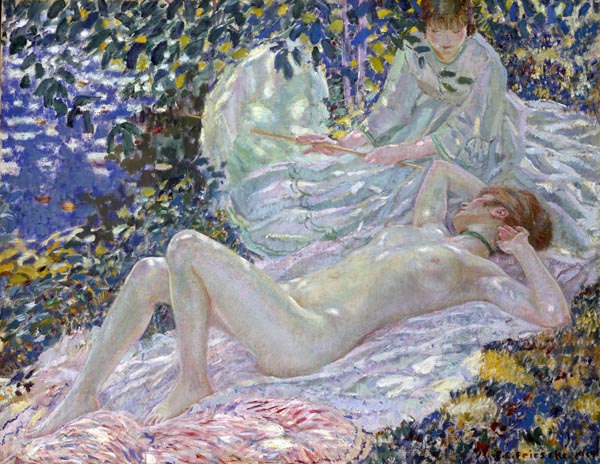
‘Summer’
Frederick Carl Frieseke (American, 1874 – 1939)
The Met
Spleen
(Romances Sans Paroles: Aquarelles, Spleen)
The roses were so red
And the ivy was so black.
Dear, at a turn of your head
My despair flooded back.
The sky was too blue, and too tender,
The sea too green, air lacked force.
I always fear – it must be remembered,
Some atrocious act of yours.
I’m tired of holly with varnished leaves
And shivering boxwood too,
And the countryside’s infinity
All things, alas, but you!
A Poor Young Shepherd
(Romances Sans Paroles: Aquarelles, J’ai peur d’un baiser)
I’m afraid of a kiss
Like the kiss of a bee.
I suffer like this
And wake endlessly.
I’m afraid of a kiss!
Yet I love Kate
And her sweet gaze.
She’s delicate
With a long pale face.
Oh! How I love Kate!
It’s Saint Valentine’s Day!
I must, I don’t dare
Tomorrow, they say…
It’s a dreadful affair
Is Saint Valentine’s Day!
She’s promised to me,
Fortuitously!
But the difficulty
For a lover, poor he,
With his darling to be!
Streets – Dansons La Gigue!
(Romances Sans Paroles: Streets I)
Let’s dance a jig!
I loved, above all, her pretty eyes
Brighter than stars in the skies,
I loved her malicious eyes likewise.
Let’s dance a jig!
She for sure, she knew the art
Of breaking a poor lover’s heart,
How charmingly she played the part.
Let’s dance a jig!
But I find it even better
That kiss of her mouth in flower
Now, in my heart, she’s a dead letter.
Let’s dance a jig!
I recall, oh I recall
The hours, the words we let fall,
And this the very best of all.
Let’s dance a jig!
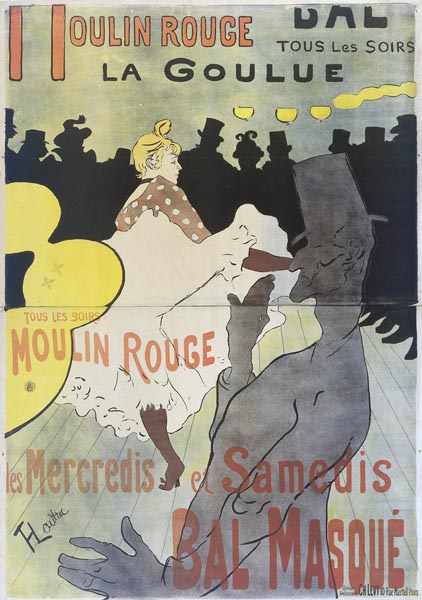
‘Moulin-Rouge’
Henri de Toulouse-Lautrec (French, 1864 - 1901)
The Rijksmuseum
Streets – O La Rivière Dans La Rue!
(Romances Sans Paroles: Streets II)
O the river in the street!
Fantastically you’ll meet
Behind high five-foot walls,
Never a sound does it make,
Its water pure yet opaque,
Peacefully there it crawls.
The roadway’s broad and so
The waters widely flow,
Pale as the dead, and lack
Reflections of aught but mist,
Though the dawn will insist
On cottages yellow and black.
Paddington
Beauty Of Women….
(Sagesse: Bk I, I)
Beauty of women, their frailty, and those pale hands
Which often do good yet can bring all suffering.
And those eyes where of the creature nothing
Is left but enough to say enough to man’s demands.
And forever, the maternal sleeper’s call,
Even when it lies, that voice! The dawn
Cry, when soft vespers are sung, signal new-born
Or sweet sob that dies in the folds of a shawl! ...
Harshness of man! Vile leaden life here below!
Ah! Let something at least, far from kisses and blows,
Let something survive for a moment on the slope,
Something the childlike subtle heart contains,
Goodness, respect! For dying what can we hope
To take with us, and truly, what when death comes remains?
No. It was Gallican….
(Sagesse: Bk I, IV)
No it was Gallican, that era, and Jansenist!
Towards the Middle Ages vast and delicate
I needs must sail, the shipwreck in my heart,
Far from our carnal mind and the sad flesh.
King, statesman, monk, chemist, artisan, hour
Of the architect, soldier, doctor, advocate,
What times! Yes, may my ruined heart voyage yet
Towards all that ardent, supple artistic power!
There let me take part – anyhow, at the court
Or elsewhere, what matter – in that vital thing,
And may I, a saint, do good, think true thoughts,
High theology and solid morality, journeying
Led by the unique folly the Cross has brought,
O mad Cathedral, soaring on stony wings!
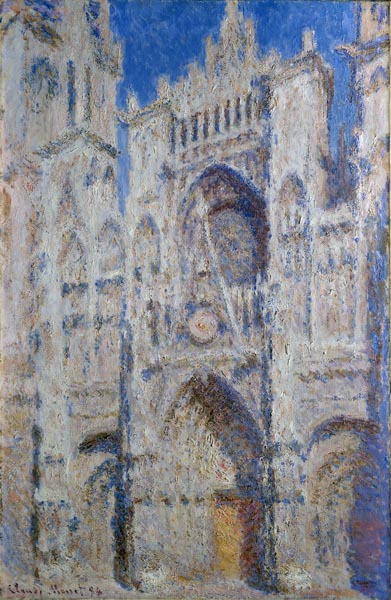
‘Rouen Cathedral: The Portal (Sunlight)’
Claude Monet (French, 1840 - 1926)
The Met
Hear The Sweetest Song….
(Sagesse: Bk I, V)
Hear the sweetest song pass
That weeps for your sole delight.
It is discreet and so light:
A water-drop trembling on glass!
A voice known to you (and dear?)
But at present misted and veiled
Like a widow desolate, assailed,
Yet like her still proud, it appears,
And in the long folds of a veil
Stirred by the autumn breeze,
Hidden, to startled heart reveals
The truth like the star so pale.
It says, that voice you know,
That our life is goodness at last,
That hatred and envy pass,
Nothing’s left, death lays all low.
It speaks to us also of glory
Of humility, of asking no more,
And the marriage of golden ore
To sweet joy of peace without victory.
Welcome the voice that persists
In its naïve epithalamium,
Nothing more for the soul, now, come,
Than to render soul-sadness less.
It is hard-pressed, and passing by,
The suffering soul without anger,
And the moral is all too clear!
Listen to the song that is wise.
I Came, Calm, An Orphan….
(Sagesse: Bk III, II)
Kaspar Hauser speaks…
I came here, calm, an orphan,
My sole wealth my tranquil eyes,
To find the men in great cities, I
Proved not so likely a one.
At twenty new trouble appeared
In the guise of amorous fires,
Sweet women fuelled my desires:
They found me less sweet I fear.
Though lacking king or country
And somewhat less than brave,
I wished for death’s glorious grave:
But Death had no wish for me.
Was I born too soon or too late?
Why in this world am I found?
O, you there, my pain’s profound;
Now, for poor Kaspar, pray!
Note: Kaspar Hauser (1812? –1833) was a German youth who claimed to have grown up in the isolation of a darkened cell. Hauser’s claims, and his subsequent death by stabbing, sparked great debate and controversy.
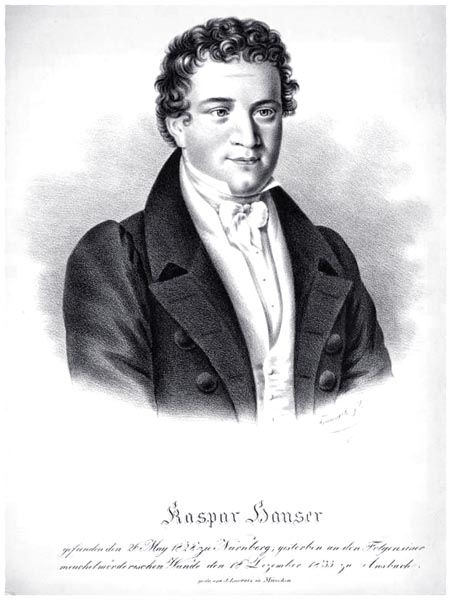
‘Hauser, Kaspar, 1812-1833’
The New York Public Library
The Sky’s Above The Roof….
(Sagesse: Bk III, VI)
The sky’s above the roof
So blue, so calm!
A tree above the roof
Waves its palm.
The bell in the sky you see
Gently rings.
A bird on the tree you see
Sadly sings.
My God, my God, life’s there,
Simple and sweet.
A peaceful rumbling there,
The town’s at our feet.
– What have you done, O you there
Who endlessly cry,
Say: what have you done there
With Youth gone by?
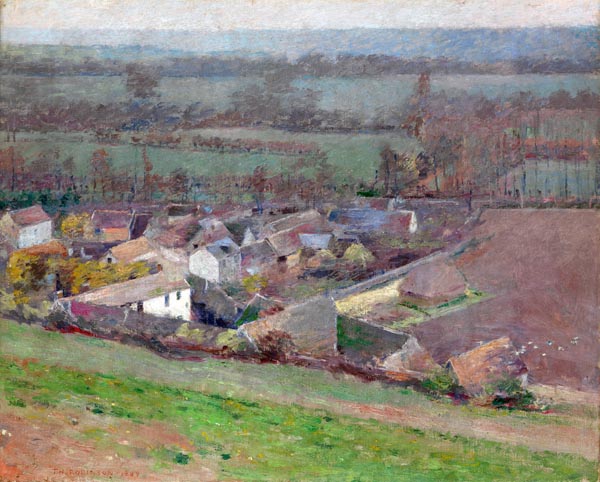
‘A Bird's-Eye View’
Theodore Robinson (American, 1852–1896)
The Met
Sadness, The Bodily Weariness…
(Sagesse: Bk III, X)
Sadness, the bodily weariness of man,
Have moved me, swayed me, made me pity.
Ah, most when dark slumbers take me,
When sheets score the skin, oppress the hand.
And how weak in tomorrow’s fever
Still warm from the bath that withers
Like a bird on a rooftop that shivers!
And feet, in pain from the road forever,
And the chest, bruised by a double-blow,
And the mouth, still a bleeding wound,
And the trembling flesh, a fragile mound,
And the eyes, poor eyes, so lovely that so
Hint at the sorrow of seeing the end! …
Sad body! So frail, so tormented a friend!
Pierrot
(Jadis et Naguère: Pierrot)
For Léon Valade
This is no moonstruck dreamer of tales
Mocking ancestral portraits overhead;
His gaiety, alas, is, like his candle, dead –
And his spectre haunts us now, thin as a rail.
There, in the terror of endless lightning,
His pale blouse, a cold wind blows, takes shape
Like a winding sheet, and his mouth agape
Seems to howl at the blind worms’ gnawing.
With the sound of a night-bird’s passing grace,
His white sleeves mark out vaguely in space
Wild foolish signs to which no one replies.
His eyes are vast holes where phosphorus burns,
And his make-up renders more frightful in turn
The bloodless face, the sharp nose, of one who dies.
Poetic Art
(Jadis et Naguère: Art Poétique)
For Charles Morice
Music above everything,
The Imbalanced preferred
Vaguer more soluble in air
Nothing weighty, fixed therein.
And don’t go choosing your words
Without some confusion of vision:
Nothing’s dearer than shadowy verse
Where Precision weds Indecision.
It’s beautiful eyes concealed by veils,
It’s a broad day quivering at noon,
It’s the blue disorder of bright stars
In autumn skies, cool, with no moon!
For we always desire Nuance,
Not Colour, nuance evermore!
Oh, nuance alone can wed
Dream with dream, flute with horn!
From murderous Epigrams flee,
Cruel Wit and laughter impure
That brings tears to the high Azure,
And all that base garlic cuisine!
Take eloquence, wring its neck!
You’d do well, while you’re in flow,
To make Rhyme a fraction wiser.
If we don’t look out, where will it go?
Oh who’ll tell of the wrongs of Rhyme?
What mad Negro, or tone-deaf child,
Created this penny jewel, this crime,
That rings hollow, false under the file?
Music once more and forever!
Let your line be a thing so light,
It feels like a soul that soars in flight
To new skies and fresh lovers.
Let your line be finest adventure
Afloat on the tense dawn wind
That goes wakening thyme and mint…
All the rest – is literature.
Languor
(Jadis Et Naguère: Langueur)
For Georges Courteline
I am the Empire at the end of decadent days,
Watching the pale tall Barbarians advance
While composing acrostics, in my indolence,
In a gilded style where the sun’s languor plays.
The lonely soul aches with a vast ennui.
They say bloody battles are being fought down there.
O lacking power, so feeble, such tardy prayer,
O lacking the will to embellish reality!
O lacking the will and power to die a little!
Ah! All is drunk! Bathyllus, life yet laughed away?
Ah! All is eaten and drunk! No more to say!
Only, a slightly foolish poem that burns well,
Only, a slightly errant slave who neglects you,
Only, a kind of vague ennui that afflicts you!
Circumspection
(Jadis Et Naguère: Circonspection)
Give me your hand, still your breath, let’s rest
Under this great tree where the breeze dies
Beneath grey branches, in broken sighs,
The soft, tender rays of the moon caress.
Motionless, and lowering our eyes,
Not thinking, dreaming. Let love that tires
Have its moment, and happiness that expires,
Our hair brushed by the owl as it flies.
Let’s forget to hope. Discreet, content,
So the soul of each of us stays intent
On this calm, this quiet death of the sun.
We’ll rest, silent, in a peaceful nocturne:
It’s wrong to disturb his sleep, this one,
Nature, the god, fierce and taciturn.
To Madame X…
(Amour: A Madame X…)
On sending her a pansy
When you loved me (were you sure?)
You sent me, newly disclosed,
A sweet and dear little rose,
A fresh emblem: its message pure.
It declared in its own tongue
Those ‘pledges of first love’: your
Heart in mine for evermore
All the things usually sung.
Three years have passed. See us now!
Yet I still keep the memory
Of your rose, and here’s my glory:
Still to ponder on those vows.
Alas! Though I’ve the memory
I’ve lost the flower, and that heart.
To the four winds went that flowery art.
And the heart? I wonder seriously
Was it ever mine? Between us now?
As for me, mine still beats the same,
Ever humble. An emblem of the flame,
In its turn. Say, will you allow
Me, all burdened now, to send
You a sad salaam, well here it is.
Here before you, this poor Negress?
She lacks joy’s colour in the wind,
Yet she shows the colour of my heart;
I plucked her from the earth, between
The prisoned stones where I’m seen,
Walking in true sadness; apart.
What more does she need to show?
Accept her, if she gives you pleasure.
I’ve done as much now in picking her,
Almost a scabious, the flower-of-widows.
Note: Fleur-des-veuves, Scabiosa atropurpurea.
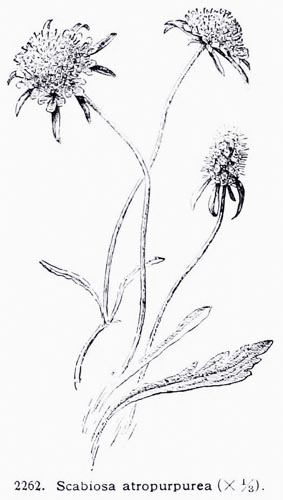
‘Scabiosa atropurpurea’
Cyclopedia of American Horticulture - Liberty Hyde Bailey, Wilhelm b. Miller (p183, 1900)
Internet Archive Book Images
Parsifal
(Amour: Parsifal)
For Jules Tellier
Parsifal has conquered the girls, their sweet
Chatter, amusing lust – and his inclination,
A virgin boy’s, towards the Flesh, tempted
To love their little tits and gentle babble;
He’s conquered lovely Woman, of subtle
Heart, showing her cool arms, provoking breast;
He’s conquered Hell, returned to his tent,
With a weighty trophy on boyish arm,
With the lance that pierced the sacred Side!
He’s cured the king, here he’s king, abides,
And priest of the quintessential holy Treasure.
Worships in golden robes, a symbol, glory’s home,
Vessel where the true Blood shines, the pure,
– And, O those children’s voices singing in the dome!
Note: The last line is quoted by Eliot, in French, in The Wasteland (with reference to the Fisher King).
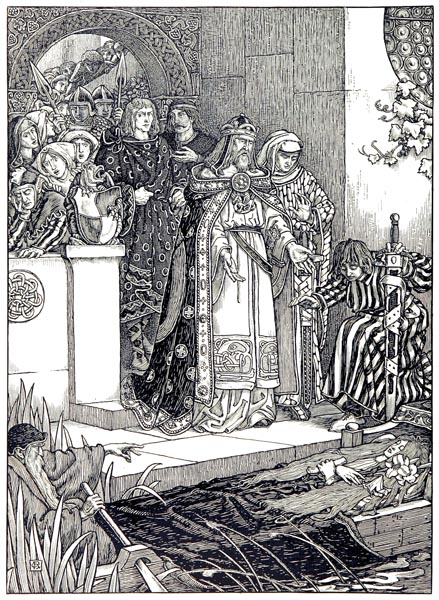
‘There two stood arm'd and kept the door; to whom all up the marble stair, tier over tier’
Idylls of the King. Vivien. Elaine. Enid. Guinevere - Lord Alfred Tennyson, George Woolliscroft Rhead, Louis Rhead (p88, 1898)
The British Library
Evening Thought
(Amour: Pensée du Soir)
For Ernest Raynaud
Here on the pale cold grass of exile, lost
Among pine and yew-trees silvered by frost,
Or wandering, like those forms that still command
Our dreams, through the vile Scythian land,
While all around, shepherds of fabulous flocks,
Pale blue-eyed Barbarians roam the rocks,
The poet of the Art of Love, tender Ovid
Sweeps the horizon, his gaze deep and fervid,
And sadly contemplates the immense sea,
Hair grown thin and grey that the stormy
North-winds tangle on wrinkled forehead,
Torn clothes rendering the flesh chilled instead,
Under sparse brows, tired eyes no longer bright,
The beard dense, matted, alas, and almost white!
All those tokens that speak of expiatory
Mourning, a sinister and lamentable story
Of excess love, bitter desire, and more:
The fury, too, and censure of his Emperor.
Ovid dreams wearily of Rome, and vainly
Yet, of Rome adorned by his illusory glory.
Now, Jesus, you plunge me, rightly, into darkness:
Though, no Ovid, here, at least, is my wilderness.
O La Femme!
(Amour: Lucien Létinois III)
O Woman! Prudent, wise, calm enemy,
Showing no half measures in your victory,
Killing the wounded, plundering the spoils,
Extending flame and steel to distant toils,
Or a good friend, fickle and yet still good,
And gentle, often too gentle, like glowing wood,
That lulls at leisure, intrigues us, puts to sleep,
Sometimes draws the sleeper on to that deep
Delicious death, in which the soul dies too!
Woman never to be relinquished! Here, for you
Not without an expression of unearned regret,
Is the insult of one your remorse alone might yet
Restore. But since you show no more remorse
Than a yew-tree has for deep shadow, pause
For the last farewell, fatal tree under which, I say,
Humanity has sheltered, from Eden to This Sad Day.
Sleeping Beauty Dreams…
(Amour: Lucien Létinois XI)
Sleeping Beauty dreams. Cinderella dozes.
Blue-Beard’s wife? She awaits her brothers;
And Hop-o’-My-Thumb, far from the fat ogre,
Sits on the grass there repeating his prayers.
The Bird-The-Colour-Of-Time glides through the air
Which caresses the leaves at the hedgerow’s crest,
Dense and low, dreaming of shading there
The sowing, and hay-making and all the rest.
The flowers of the fields, the innumerable flowers,
Lovelier than gardens where Man has set his mark,
His husbandry and his taste – the people’s flowers! –
Float like fine silken veils in straw-gilded dark.
And, simply flowering, temper the wind’s harshness,
The powerful wind, that only now dies away,
As the afternoon is failing. And the sweetness
Of the land cries to the heart: Fade now, or stay!
The wheat still green, the rye already blond
Welcome the swallow to their peaceful fires.
Bird voices call to the furrows, far beyond,
So sweet, there’s no other music for our desires…
Donkey-skin returns. They beat the retreat – hear there! –
On Riquet-With-The Tuft’s neighbouring estate,
And we reach the old magic inn’s deep corner where
The soup cooks, and stirs itself, while we wait!
Note: The names are characters from French fairy-tales.
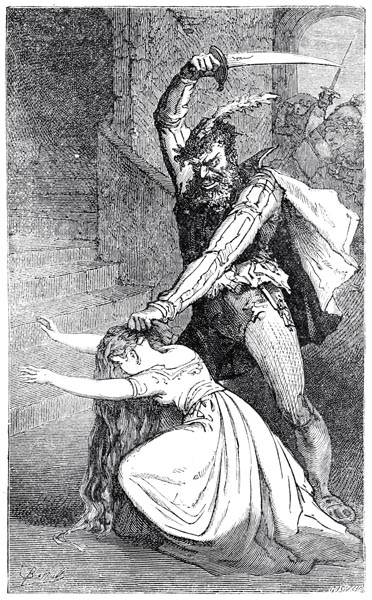
‘La Barbe Bleue’
Contes De Fees; Charles Perrault, Madame Jeanne-Marie Leprince de Beaumont, Marie-Catherine Madame d'Aulnoy (p20, 1908)
The British Library
Allegory
(Parallèlement: Allégorie)
An ancient temple slowly sinking lower!
On the vague crest of a yellow hill, alone,
A deposed king too, weeping on his throne,
Gazes, pale, in the silver stream’s slow mirror.
With dormant grace and look, somnolent,
An aged naiad, by an alder tree forlorn,
With a slight willow twig annoys a faun,
Who smiles at her, bucolic and gallant.
A dull and naïve subject that saddens me:
Say, what poet with all his artistry,
What morose work, has an effect on you,
Perhaps some worn outmoded tapestry
Banal as the opera’s décor to the view,
Contrived, alas! Like my destiny?
Sappho
(Parallèlement: Sappho)
Intense, eyes sunken and breasts taut,
Sappho, driven by languorous desire,
Like a she-wolf haunts the frozen shore.
She dreams of Phaon, forgetful of the lyre,
And, finding that her tears are still disdained
Tears her long hair in handfuls once again;
Then she evokes, with endless remorse,
The days when youth’s fire shed its purity
Over verse singing love, soul’s memory
Repeats to slumbering virgins evermore:
And see how her pallid eyelids’ shudder,
Leaping to the waves, called by the Fates –
While that dark sea Selene illuminates,
The pale Selene who avenges Lovers.
Note: Phaon, a boatman, famed for his beauty, beloved by Sappho; Selene, the Moon-goddess.
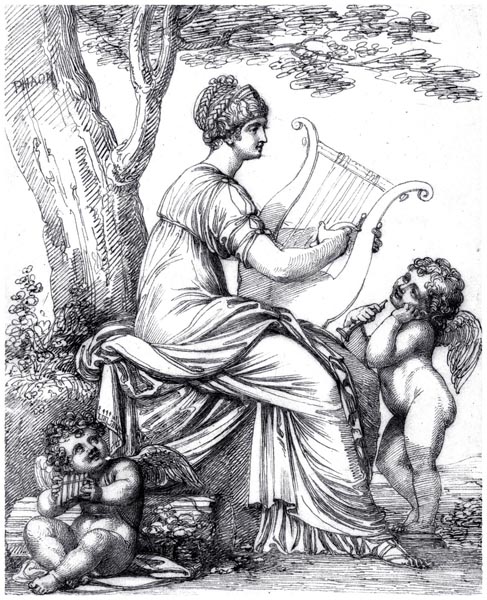
‘Sappho’
Attributed to Maria Hadfield Cosway (British, 1759 – 1838)
Yale Center for British Art
Girl
(Parallèlement: Filles I, À la Princesse Roukhine)
‘Capellos de Angelos’
(Spanish delicacy)
An ugliness of Boucher’s
Without powder in her hair,
Wildly blonde, with Venus’ flair
For debauching the whole array.
But I think it mine even so,
That mane of hers so kissed,
That fiery cascade of bliss
That lights me from head to toe.
It is more pleasing to me
Than a flame-lit circle before
The sanctuary’s holy door
The almah, pure golden fleece!
And who could sing that body
But me, its priest and its cantor,
Its humble slave and its master
Damned for it remorselessly,
Her rare sweet body, harmonious,
Smooth, and white as a rose’s
White, white as pure milk, that glows
Pink as lilies with lilac skies above?
Sweet thighs, and taut breasts,
Back, haunches, belly, a feast
For the eyes and the hands released,
And the mouth, and all the rest?
My darling, let’s see if your bed
Holds forever beneath its red curtain
An enchanted pillow for certain
That stirs; and mad sheets. To your bed!
Reversibilities
(Parallèlement: Réversibilités)
Listen to the sound they make
Those cats crying.
Wails like those in the wake
Of huntsmen flying.
Ah, sadly, in tooth and claw,
Before is now Once More!
O the far evening bells!
(That hail from where?)
See Salvation wells
From the pit down there.
Ah, by the infernal river,
Never is now Forever!
What terrifying dreams
You great blank walls!
What sobs repeated; screams,
Or mad doleful calls!
Ah, in that sad terror,
Forever now is Never!
You die softly, and apart
In the darknesses,
Without wishing to, loving heart,
Without witnesses!
Ah, in grief no redemption saw,
Once More is now Before!
Index of First Lines
- As a child, I dreamt of the Koh-i-Noor,
- Memory, memory, what do you want of me? Autumn
- Opening the narrow rickety gate,
- Ah! Fond speech! And the first mistresses!
- With sweetness, with sweetness, with sweetness!
- I often have this dream, strange, penetrating,
- The moon was shedding her plates of zinc
- Memory with Twilight glows
- The moon is red on the misted horizon;
- Like a loud flight of birds, dark complexity,
- She was playing with her cat:
- We are the artless ones,
- As the voice of a dead man might sing
- Your soul is the choicest of countries
- Pierrot, who’s no Clitandre (Molière knew)
- The sky so pale the trees so slender
- High heels fought with their long dresses,
- A monkey in brocaded vest
- Each shell, encrusted, we see,
- Scaramouche and Pulcinella,
- A summer-house’s lattices
- The shepherd’s star, it shivers,
- An ancient faun of terra-cotta
- The players of serenades
- Mystical singing-birds,
- Leander the fool,
- Last night’s wind saw Cupid’s overthrow,
- Calm in the half-light
- In the lonely old park’s frozen glass
- With her dress of grey-green frills,
- Before you leave, pale
- The moon, white,
- A Saint in her aureole,
- Home, the lamp’s circumscribed glow:
- I was almost afraid, it’s so,
- The noise from bars, the pavement’s mire,
- Is it not so? Despite the fools, the malevolent
- It’s languorous ecstasy,
- It rains in my heart
- You see we need to pardon everything.
- The piano kissed by a delicate hand
- Oh sad, sad forever my soul
- Through interminable land
- The shadow of trees on the mist-drenched river
- Bricks and tiles
- Through black grass
- Turning, turning, fine horses you go,
- By bright fields, the winds fight
- I see you, still. I opened the door.
- Here are the fruits, the flowers, the leaves, the wands,
- The roses were so red
- I’m afraid of a kiss
- Let’s dance a jig!
- O the river in the street!
- Beauty of women, their frailty, and those pale hands
- No it was Gallican, that era, and Jansenist!
- Hear the sweetest song pass
- I came here, calm, an orphan,
- The sky’s above the roof
- Sadness, the bodily weariness of man,
- This is no moonstruck dreamer of tales
- Music above everything,
- I am the Empire at the end of decadent days,
- Give me your hand, still your breath, let’s rest
- When you loved me (were you sure?)
- Parsifal has conquered the girls, their sweet
- Here on the pale cold grass of exile, lost
- O Woman! Prudent, wise, calm enemy,
- Sleeping Beauty dreams. Cinderella dozes.
- An ancient temple slowly sinking lower!
- Intense, eyes sunken and breasts taut,
- An ugliness of Boucher’s
- Listen to the sound they make